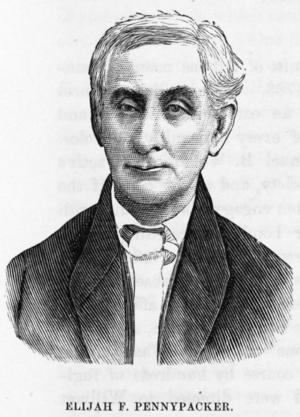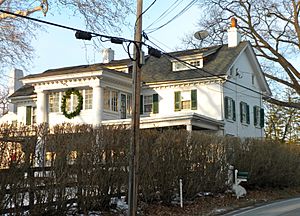Elijah F. Pennypacker facts for kids
Elijah F. Pennypacker (1804–1888) was an important person in American history. He was a politician, but he is best known for being a brave abolitionist. This means he worked to end slavery. He was also a "station master" on the Underground Railroad, which was a secret network that helped enslaved people escape to freedom. Pennypacker lived and worked in Chester County, Pennsylvania. His home, called White Horse Farm, was a safe house for people seeking freedom.
As a station master, Pennypacker helped hundreds of enslaved people escape. It's amazing that none of the people he helped were ever caught by authorities or bounty hunters!
Contents
Elijah's Early Life and Career
Elijah Pennypacker was born on November 20, 1804, in Chester County, Pennsylvania. He went to school in Burlington, New Jersey. After finishing school, he started working as a surveyor. This means he measured land and helped map out areas. Later, he worked in real estate in Pennsylvania. He even helped with some of the first surveys for the Pennsylvania railroad system.
Starting in Politics
Pennypacker's political journey began in 1831. He became a member of the Pennsylvania State Legislature. He served there until 1835. During his time as a politician, Pennypacker focused on important topics like banking and making public education better for everyone. After that, he worked for the Pennsylvania Canal Commission from 1836 to 1838.
Helping People Find Freedom
In 1841, Pennypacker joined the Religious Society of Friends (also known as Quakers). This religious group was very active in the movement to end slavery. That's when Pennypacker truly began his work as an abolitionist. His strong feelings against slavery were also shaped by Thaddeus Stevens, another politician he worked with in the Pennsylvania State Assembly. By 1840, Pennypacker was already actively involved in the Underground Railroad.
What Was a Stationmaster?
In the Underground Railroad, people used terms like "conductor" and "stationmaster." These terms came from real railroads. Pennypacker was both a conductor (someone who guided people) and a stationmaster (someone who ran a safe house). His home was a "depot" or safe stop along the secret route.
The Secret Routes to Freedom
When Pennypacker was active, enslaved people often traveled along the shores of the Chesapeake Bay. They would cross the Susquehanna River at Havre de Grace, Maryland. From there, they would make their way to Pennypacker's safe house in Phoenixville, Pennsylvania.
Once at his home, Pennypacker helped them reach different cities in southeast Pennsylvania. These cities included Philadelphia, Norristown, Quakertown, and Reading. From these places, the people seeking freedom could finally be truly free. Sometimes, Pennypacker worked with another famous abolitionist named William Still. Still was part of the Vigilant Association of Philadelphia. They would arrange for committee members to meet the freedom seekers after they left Pennypacker's house. Sometimes, these brave people even left by actual trains! Pennypacker himself personally transported some of the enslaved people. It's truly amazing that none of the people he helped were ever caught.
Pennypacker's safe house was his own family home, Whitehorse Farm. It was built way back in 1770 and is located in Willistown Township, Chester County, Pennsylvania. He lived there his whole life. In the years before the Emancipation Proclamation (which declared enslaved people free), Pennypacker was involved in anti-slavery groups at the local, county, and state levels.
Pennypacker's work in the Underground Railroad, along with that of Dr. Bartholomew Fussell, helped hundreds of enslaved people find freedom in Chester County, Pennsylvania.
A Tribute to Pennypacker
The famous abolitionist and poet John Greenleaf Whittier once said about Pennypacker:
In mind, body, and brave championship of the cause of freedom he was one of the most remarkable men I ever knew.
Besides helping enslaved people, Pennypacker also helped people from Ireland who were suffering during the Irish Potato Famine in 1848.
Later Life and Passing
After the American Civil War ended, Pennypacker joined the Prohibition Party. This party wanted to ban alcohol. He tried to run for public office as a member of this party, but he wasn't successful. He also helped start and became an officer in the Pennsylvania Mutual Fire Insurance Company.
Elijah Pennypacker passed away on January 4, 1888. He was buried at the Schuykill Friends Meeting Cemetery in Phoenixville, Pennsylvania.
See also
- Quakers in the Abolition Movement
 | Selma Burke |
 | Pauline Powell Burns |
 | Frederick J. Brown |
 | Robert Blackburn |



